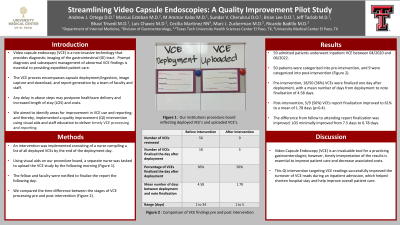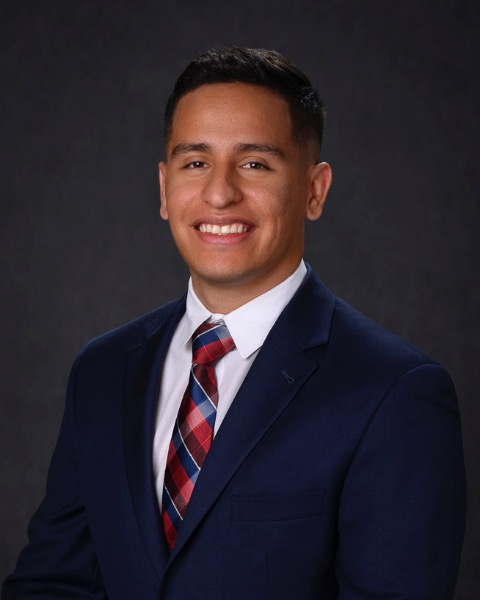Back


Poster Session D - Tuesday Morning
Category: Practice Management
D0631 - Streamlining Video Capsule Endoscopies: A Quality Improvement Pilot Study
Tuesday, October 25, 2022
10:00 AM – 12:00 PM ET
Location: Crown Ballroom

Has Audio

Andrew J. Ortega, DO
Texas Tech University Health Sciences Center
El Paso, TX
Presenting Author(s)
Andrew J. Ortega, DO, Marcus Esteban, MD, M Ammar Kalas, MD, Sundar V. Cherukuri, DO, Brian Lee, DO, Jeff Taclob, MD, Bhavi Trivedi, MD, Luis Chavez, MD, Cecilia Martinez, RN, Marc J. Zuckerman, MD, Ricardo Badillo, MD
Texas Tech University Health Sciences Center, El Paso, TX
Introduction: Video capsule endoscopy (VCE) is a non-invasive technology that provides diagnostic imaging of the gastrointestinal (GI) tract. Prompt diagnosis and subsequent management of abnormal VCE findings is essential to providing expedited patient care. The VCE process encompasses capsule deployment/ingestion, image capture and download, and report generation by a team of faculty and staff. Any delay in above steps may postpone healthcare delivery and increased length of stay (LOS) and costs. Due to subjective reports of delays in VCE result reporting in our facility, we aimed to identify areas for improvement in VCE use and reporting; and thereby, implement a quality improvement (QI) intervention using visual aids and staff education to deliver timely VCE processing and reporting.
Methods: A retrospective review of inpatient VCE revealed only 36% of inpatient VCE reports were finalized one day after capsule deployment thought to be due to miscommunication between fellows and staff regarding VCE timing. An intervention was implemented consisting of a nurse compiling a list of all deployed VCEs by the end of the deployment day. Using visual aids on our procedure board, a separate nurse was tasked to upload the VCE study by the following morning. With the visual aids, the fellow and faculty were notified to finalize the report the following day. We compared the time difference between the stages of VCE processing pre and post-intervention
Results: 59 admitted patients underwent inpatient VCE between 04/2020 and 06/2022. 50 patients were categorized into pre-intervention, and 9 were categorized into post-intervention (Table 1). Pre-intervention, 18/50 (36%) VCEs were finalized one day after deployment, with a mean number of days from deployment to note finalization of 4.58 days. Post-intervention, 5/9 (56%) VCEs report finalization improved to 61% to a mean of 1.78 days(p=0.4) . The difference in time from deployment to fellow interpretation improved by 61% from 2.3 to 0.89 days, and the difference from fellow to attending report finalization was improved. LOS minimally improved from 7.5 days to 6.78 days (p=0.62).
Discussion: VCE is an invaluable tool for a practicing gastroenterologist, however, timely interpretation of the results is essential to improve patient care and decrease associated costs. This QI intervention targeting VCE readings successfully improved the turnover of VCE reads during an inpatient admission, which helped shorten hospital stay and help improve overall patient care.

Disclosures:
Andrew J. Ortega, DO, Marcus Esteban, MD, M Ammar Kalas, MD, Sundar V. Cherukuri, DO, Brian Lee, DO, Jeff Taclob, MD, Bhavi Trivedi, MD, Luis Chavez, MD, Cecilia Martinez, RN, Marc J. Zuckerman, MD, Ricardo Badillo, MD. D0631 - Streamlining Video Capsule Endoscopies: A Quality Improvement Pilot Study, ACG 2022 Annual Scientific Meeting Abstracts. Charlotte, NC: American College of Gastroenterology.
Texas Tech University Health Sciences Center, El Paso, TX
Introduction: Video capsule endoscopy (VCE) is a non-invasive technology that provides diagnostic imaging of the gastrointestinal (GI) tract. Prompt diagnosis and subsequent management of abnormal VCE findings is essential to providing expedited patient care. The VCE process encompasses capsule deployment/ingestion, image capture and download, and report generation by a team of faculty and staff. Any delay in above steps may postpone healthcare delivery and increased length of stay (LOS) and costs. Due to subjective reports of delays in VCE result reporting in our facility, we aimed to identify areas for improvement in VCE use and reporting; and thereby, implement a quality improvement (QI) intervention using visual aids and staff education to deliver timely VCE processing and reporting.
Methods: A retrospective review of inpatient VCE revealed only 36% of inpatient VCE reports were finalized one day after capsule deployment thought to be due to miscommunication between fellows and staff regarding VCE timing. An intervention was implemented consisting of a nurse compiling a list of all deployed VCEs by the end of the deployment day. Using visual aids on our procedure board, a separate nurse was tasked to upload the VCE study by the following morning. With the visual aids, the fellow and faculty were notified to finalize the report the following day. We compared the time difference between the stages of VCE processing pre and post-intervention
Results: 59 admitted patients underwent inpatient VCE between 04/2020 and 06/2022. 50 patients were categorized into pre-intervention, and 9 were categorized into post-intervention (Table 1). Pre-intervention, 18/50 (36%) VCEs were finalized one day after deployment, with a mean number of days from deployment to note finalization of 4.58 days. Post-intervention, 5/9 (56%) VCEs report finalization improved to 61% to a mean of 1.78 days(p=0.4) . The difference in time from deployment to fellow interpretation improved by 61% from 2.3 to 0.89 days, and the difference from fellow to attending report finalization was improved. LOS minimally improved from 7.5 days to 6.78 days (p=0.62).
Discussion: VCE is an invaluable tool for a practicing gastroenterologist, however, timely interpretation of the results is essential to improve patient care and decrease associated costs. This QI intervention targeting VCE readings successfully improved the turnover of VCE reads during an inpatient admission, which helped shorten hospital stay and help improve overall patient care.

Figure: Figure 1: Comparison of video capsule endoscopy (VCE) statistics before and after the intervention.
Disclosures:
Andrew Ortega indicated no relevant financial relationships.
Marcus Esteban indicated no relevant financial relationships.
M Ammar Kalas indicated no relevant financial relationships.
Sundar Cherukuri indicated no relevant financial relationships.
Brian Lee indicated no relevant financial relationships.
Jeff Taclob indicated no relevant financial relationships.
Bhavi Trivedi indicated no relevant financial relationships.
Luis Chavez indicated no relevant financial relationships.
Cecilia Martinez indicated no relevant financial relationships.
Marc Zuckerman indicated no relevant financial relationships.
Ricardo Badillo indicated no relevant financial relationships.
Andrew J. Ortega, DO, Marcus Esteban, MD, M Ammar Kalas, MD, Sundar V. Cherukuri, DO, Brian Lee, DO, Jeff Taclob, MD, Bhavi Trivedi, MD, Luis Chavez, MD, Cecilia Martinez, RN, Marc J. Zuckerman, MD, Ricardo Badillo, MD. D0631 - Streamlining Video Capsule Endoscopies: A Quality Improvement Pilot Study, ACG 2022 Annual Scientific Meeting Abstracts. Charlotte, NC: American College of Gastroenterology.
